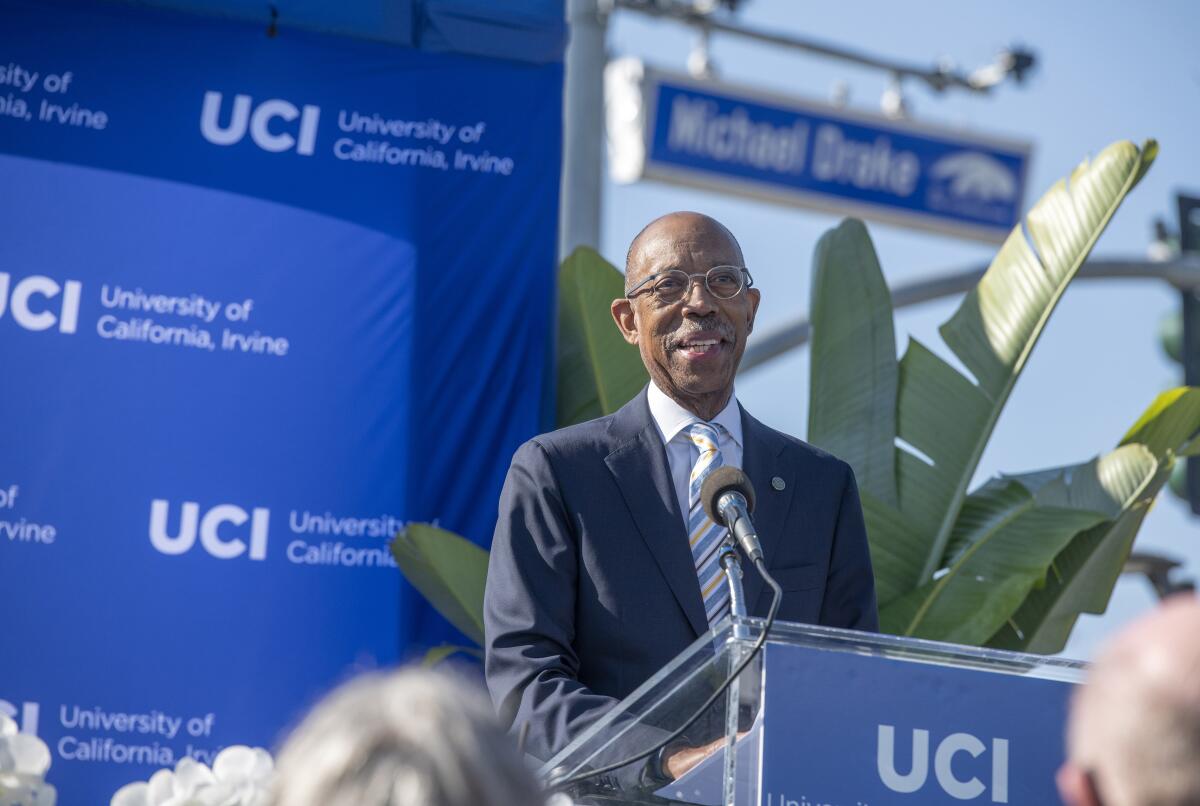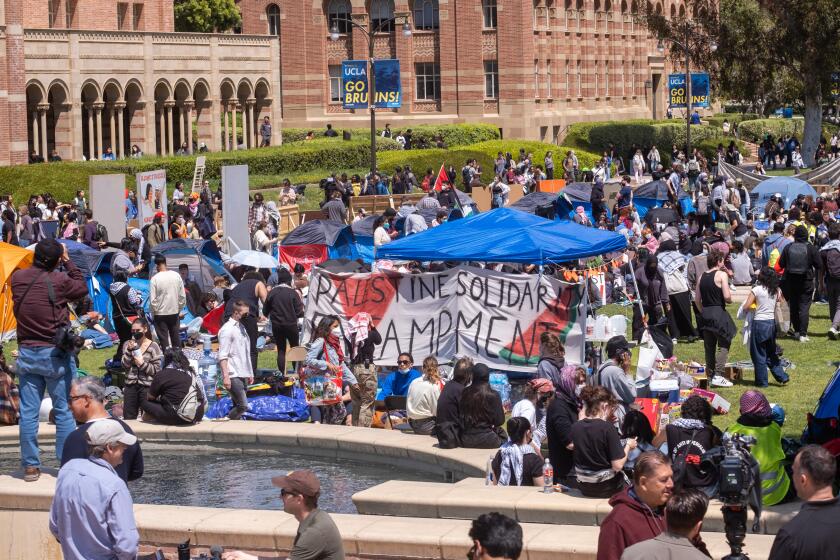UC President Drake to step down after managing pandemic, policing, protests, budget woes

University of California President Michael V. Drake announced Wednesday he would step down at the end of the 2024-25 academic year from the nation’s top public research university system after managing the pandemic, campus policing, tumultuous protests and budget woes during what will have been a challenging five-year tenure.
Drake, 74, brought leadership experience, academic credentials, political savvy and personal qualities that helped steady UC at a time of turmoil when he took the helm in 2020 after serving for four decades in the UC system and then as president of The Ohio State University. During his UC presidency, the pandemic blew up campus budgets and sowed uncertainty over reopening classrooms. The 2020 killing of George Floyd by a white police officer triggered demands to defund campus law enforcement. Relationships with Sacramento had frayed, jeopardizing state funding. Then last year campuses were roiled by protests over the Israel-Hamas war.
“It has been the honor of a lifetime to serve as president of the University of California these past several years, and I am immensely proud of what the UC community has accomplished,” Drake said in a statement. “At every turn, I have sought to listen to those I served, to uphold our shared UC values, and to do all I could to leave this institution in better shape than it was before. I’m proud to see the University continuing to make a positive impact on the lives of countless Californians through research, teaching, and public service.”
Drake guided the system’s transition to remote instruction and helped develop safety protocols — aided by his own background in public health with a medical degree in ophthalmology and experience as UC vice president for health affairs in 2000.
Drake also had to navigate a high-profile controversy when UCLA announced two years ago that it planned to leave the Pac-12 for the Big Ten — a move that infuriated Gov. Gavin Newsom, many regents and UC Berkeley leaders who were left in the lurch with a collapsing athletic conference. The regents ultimately directed UCLA to pay Berkeley $10 million annually for three years to share some of the revenue the Westwood campus will receive from the Big Ten’s more lucrative media rights deal.
As the first Black president in UC history, Drake spoke about his own negative personal experiences with policing — he said he and his sons had been racially profiled. Such experiences helped him lead a systemwide effort to improve safety practices. And his lifelong commitment to opening access to diverse students produced record expansions in enrollment, with UC announcing this week that the system had admitted the largest, most diverse class of students for fall 2024 ever. His initiatives included creation of the UC Native American Opportunity Plan, which provides free tuition for members of federally recognized tribes.
The University of California admitted the largest, most diverse class of Californians for fall 2024, with gains in low-income, first-generation and underrepresented students.
Drake also is credited with improving relations with Newsom and state legislators, and hammering out a five-year funding compact that brought more financial stability to the university. UC Academic Senate Chair Jim Steintrager said the reset in relationships, which were fractured during the tenure of previous UC President Janet Napolitano, helped UC secure a modest funding increase this year when many expected a major cut.
Newsom, in a statement, praised Drake and his accomplishments.
“President Drake took the reins of the University of California during the height of the pandemic and has led with grace and vision in the years since,” Newsom said. “He has used his decades of experience to advocate for better access to higher education for all Californians and has always fought for academic excellence. On behalf of all Californians, I thank President Drake for his leadership, for growing our UC system, and for paving a brighter path forward for our state. His legacy of service in higher education has undoubtedly helped us grow the next generation of extraordinary California leaders, and it’s been an honor to work alongside him.”
But Drake has also drawn criticism on a number of fronts for failing to address major issues. The Israel-Hamas war triggered explosive protests and deeply divided campuses over free speech, academic freedom and harassment of supporters from all sides. Drake, under pressure from the Legislature, is currently working with chancellors to craft a plan to consistently and uniformly enforce campus rules on protests — but that could bring down the kind of police action this fall that caused uproars at UCLA, UC San Diego, UC Irvine, UC Santa Cruz and UC Santa Barbara.
Rich Leib, outgoing chair of the UC Board of Regents, says encampments should be banned, but protests that follow campus rules are welcomed as free speech. Many regents, senior leaders agree.
Despite Drake’s personal passion to improve policing, advocates of minimizing or eliminating campus law enforcement were disappointed by his systemwide community safety plan, saying it preserved the status quo by failing to reduce campus police forces. Some students and faculty and staff members said the issues of anti-Black police violence triggered by Floyd’s murder remain unresolved.
Dylan Rodriguez, a UC Riverside professor of Black studies and media and cultural studies, said Drake also failed to create lasting solutions to the economic uncertainty and stress that set off the nation’s largest-ever academic workers’ strike in 2022. And campuses still grapple with inequitable funding, he said — adding that Riverside and UC Merced educate the most underserved students in the system but don’t get their fair share of resources.
“He left us with a larger police budget, more economic insecurity for graduate students and an irreconcilable conflict on campus regarding the ongoing genocide of Palestinians,” Rodriguez said. “He was at best mediocre if not a failure across the board.”
Rafael Jaime, president of the 48,000-member academic workers union, UAW 4811, gave Drake credit for his support of campus labor. “He played an important role in agreeing to a historic contract that made academic employment and research better and more inclusive,” Jaime said.
He added that the union is ready to work with him in the coming year to resolve unfair-labor-practice charges stemming from a union strike earlier this year over the Israel-Hamas war and another set of negotiations beginning in January for a new contract.
In other initiatives, Drake led the development of a systemwide plan to raise tuition each year for the incoming class, then freeze that level for six years. The plan, which he implemented in Ohio, has helped bring financial stability and predictability for families. He also has worked to provide more financial aid to students to help them graduate without debt.
Celene Aridin, the outgoing UC Student Assn. president, said she appreciated Drake’s willingness to meet with students and help connect them with at-times-unresponsive campus administrators — especially during the tense spring when some protesters were arrested and “brutalized” during pro-Palestinian actions. She said he “did his best, for the most part” and hoped he would include more student voices in ongoing efforts to craft plans to enforce campus rules on free speech, protests and civil rights.
Ted Mitchell, president of the American Council on Education, said Drake was one of the nation’s most accomplished educational leaders but operated quietly as an “unsung hero” who stabilized UC funding, brought in the next generation of chancellors at UCLA and UC Berkeley and kept the university system moving forward amid declining trust in higher education.
George Blumenthal, a former UC Santa Cruz chancellor and expert in higher-education governance, said Drake’s successor will have a tall task ahead overseeing the nation’s most complex public research university system — a $50-billion operation of 10 campuses, six academic health systems and three national laboratories.
In addition to upcoming labor negotiations, which are likely to be difficult, the next UC president will need to manage severe financial straits at several campuses along with an expected continuation of protests over the Israel-Hamas war and any fallout of the November presidential election.
Janet Reilly, UC Board of Regents chair, will soon appoint a committee to begin a national search for the next UC president. The search committee will include student, faculty, staff, and alumni representatives, as well as regents, and will seek input from the UC community and the public.
“It has been an extraordinary honor to work alongside Michael Drake, a thoughtful leader who has advanced the University’s mission with his forward-looking approach. I appreciate his great partnership with the UC Board of Regents as we’ve explored exciting opportunities and tackled challenging issues — all in the service of our students, faculty, staff and the broader community,” Reilly said. “President Drake has dedicated much of his career, his energy, and his expertise to the University of California and his contributions will most definitely leave a lasting impact and an inspiring legacy on this institution.”
Drake, who was born in New York City and raised in New Jersey and Sacramento as the son of a doctor and a social worker, attended Stanford University before moving to UC San Francisco for medical school. He served as chancellor of UC Irvine and UC systemwide vice president for health affairs before taking the helm at Ohio State and then UC.
A music fan, he plays the guitar and is an avid cyclist. He is married to Brenda Drake, an attorney, and has two sons and four grandchildren.
More to Read
Sign up for Essential California
The most important California stories and recommendations in your inbox every morning.
You may occasionally receive promotional content from the Los Angeles Times.













